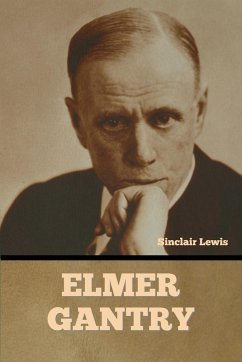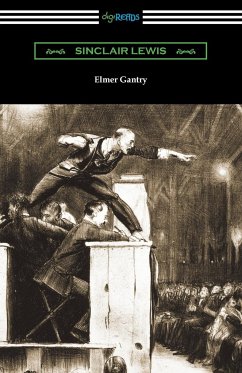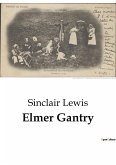Elmer Gantry is a satirical novel written by Sinclair Lewis in 1926 that presents aspects of the religious activity of America in fundamentalist and evangelistic circles and the attitudes of the 1920s public toward it. The novel's protagonist, the Reverend Dr. Elmer Gantry, is initially attracted by booze and easy money (though he eventually renounces tobacco and alcohol) and chasing women. After various forays into evangelism, he becomes a successful Methodist minister despite his hypocrisy and serial sexual indiscretions. Elmer Gantry was first published in the United States by Harcourt Trade Publishers in March 1927, dedicated by Lewis to the American journalist and satirist H. L. Mencken. The novel tells the story of a young, narcissistic, womanizing college athlete who abandons his early ambition to become a lawyer. The legal profession does not suit the unethical Gantry. After college, he attends a Baptist seminary and is ordained as a Baptist minister. While managing to cover up certain sexual indiscretions, he is thrown out of the seminary before completing his BD because he is too drunk to turn up at a church where he is supposed to preach. After several years as a travelling salesman of farm equipment, he becomes manager for Sharon Falconer, an itinerant evangelist. Gantry becomes her lover, but loses both her and his position when she is killed in a fire at her new tabernacle. After this catastrophe, he briefly acts as a "New Thought" evangelist, and eventually becomes a Methodist minister. He marries well and eventually obtains a large congregation in Lewis's fictional Midwestern city of Zenith. During his career, Gantry contributes to the downfall, physical injury, and even death of key people around him, including a sincere minister, Frank Shallard, who is plagued by doubt. Especially ironic is the way he champions love, an emotion he seems incapable of, in his sermons, preaches against ambition, when he himself is so patently ambitious, and organizes crusades against (mainly sexual) immorality, when he has difficulty resisting sexual temptation himself. On publication in 1927, Elmer Gantry created a public furor. The book was banned in Boston and other cities and denounced from pulpits across the United States. One cleric suggested that Lewis should be imprisoned for five years, and there were also threats of physical violence against the author. Evangelist Billy Sunday called Lewis "Satan's cohort". However, the book was a commercial success. It was the best-selling work of fiction in America for the year 1927, according to Publishers Weekly. Mark Schorer, then of the University of California, Berkeley, notes: "The forces of social good and enlightenment as presented in Elmer Gantry are not strong enough to offer any real resistance to the forces of social evil and banality." Schorer also says that, while researching the book, Lewis attended two or three church services every Sunday while in Kansas City, and that: "He took advantage of every possible tangential experience in the religious community." The result is a novel that satirically represents the religious activity of America in evangelistic circles and the attitudes of the 1920s toward it. Shortly after the publication of Elmer Gantry, H. G. Wells published a widely syndicated newspaper article called "The New American People", in which he largely based his observations of American culture on Lewis' novels. Elmer Gantry appears as a minor character in two later, lesser-known Lewis novels: The Man Who Knew Coolidge and Gideon Planish. George Babbitt, the namesake of one of Lewis' best-known novels, appears in Elmer Gantry very briefly during an encounter at the Zenith Athletic Club. (wikipedia.org)
Hinweis: Dieser Artikel kann nur an eine deutsche Lieferadresse ausgeliefert werden.
Hinweis: Dieser Artikel kann nur an eine deutsche Lieferadresse ausgeliefert werden.









